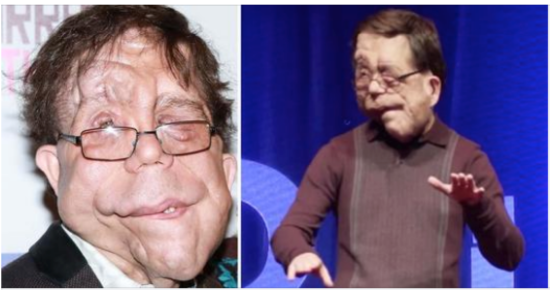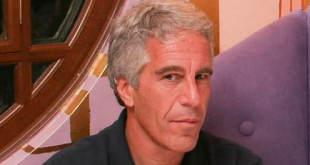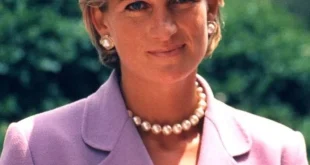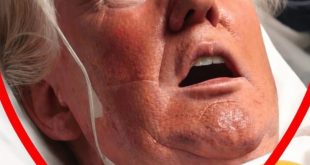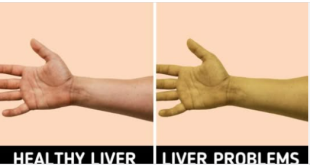Neurofibromatosis was discovered in Adam Pearson when he was five years old. His face developed tumors that significantly changed his look and caused his classmates to treat him as though he wasn’t human.
Adam made the decision to never let those who treated him poorly prevail despite the fact that his life was going to be considerably different from the usual.
As an actor and media personality who works hard to dispel the stigma associated with his disability, Pearson has emerged as a role model for many people today.His story is incredibly motivating, so please tell your friends and family about it.
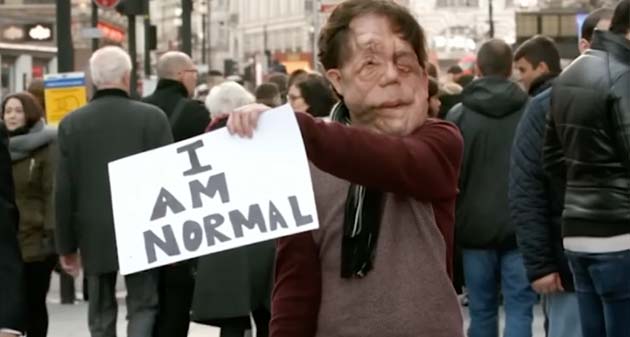
In our daily lives, it’s simple to gripe about trivial things. The bus may have been late, your morning coffee may have been a little chilly, or the television program you saw last night may not have lived up to your expectations.
Yes, it is acceptable to complain about things because everyone has a different life. Nevertheless, even if we might not be living in the perfect circumstances, it’s crucial that every so often, we take a moment to appreciate what we have.
I will now always think of people like Adam Pearson anytime I feel like I don’t have the energy to do a minor activity, like doing the dishes, or if I just feel like complaining about the little things in life. After hitting his head on a windowsill when he was five, the British guy was given a neurofibromatosis diagnosis. Sadly, the hump never went away, and as a result, tumors started to form on his face.
Since then, Pearson has led a remarkable life despite suffering abhorrent treatment from his peers and other community members. Even so, he was referred to as “Elephant Man” and “Scarface.”
Adam never let that, however, deter him from going after his dreams. He now makes every effort to spread awareness of his ailment and has even achieved movie stardom, starring with actors like Scarlett Johansson.Pearson’s life, which he had anticipated would be one reserved for outsiders, ended up becoming something quite different.
We’d love for you to share this article and his vital message since what he does now is nothing short of extraordinary.
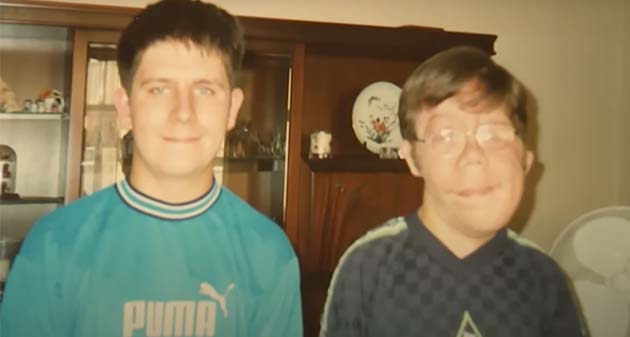
Adam Pearson’s life began just like any other baby’s. Born on January 6, 1985, in London, his first years in Croydon, South London were relatively normal.
However, when he turned five, everything changed. The bump on Adam’s face from hitting his head on a windowsill never went away. A hereditary disease called neurofibromatosis, which causes tumors to grow on nerve tissue, was immediately identified in him. The non-cancerous tumors that Pearson had all developed on his face.
Neil, Adam’s identical twin, was also affected by the same illness, however his symptoms aren’t as obvious as Adam’s.
“He looks normal,” Pearson told The Guardian in 2014. “But he’s got terrible short-term memory.”
One can only image how difficult it was for young Adam to grow up with tumors all over his face. Because of his diagnosis, he had to quickly learn the frequently nasty ways of the world, but once he started school, things really started to go south. He was horribly mistreated by his classmates, who called him insulting names and made him feel inferior to the point where he began to see himself as an outsider. Sadly, no one was aware of how to handle it.
Pearson recalled an instance in which one of his so-called pals informed him that a teacher wanted to see him in a classroom when he was speaking with The Guardian. But when he got there, a bunch of other kids were waiting for him instead of the teacher.
“I went home with spit all over my blazer,” he explained. “That was horrific.”
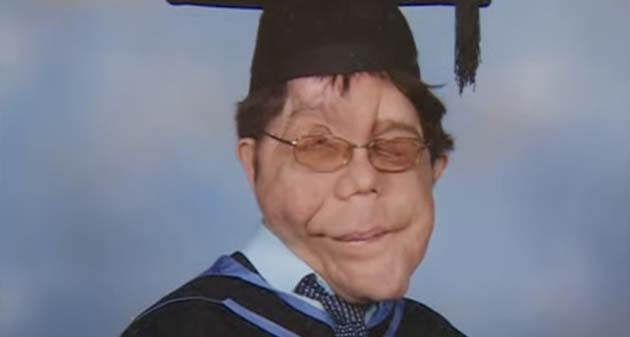
In an interview with The Mirror, Pearson further recalled his school days.
“I used to stand outside the school gates in the morning, take a massive deep breath and let it happen. I knew what I was in for. It was continuous name-calling – the classic Elephant Man, freak.”
Many children would probably have given up at that point, giving in to the bullies and letting them win. But Adam Pearson was not a normal child. Though he knew his life would be difficult, he was determined to make it through. Nothing could stop him – and he would never let bullies have the final say.
“Once I started thinking like them, the bullies had won. It’s about the life you have, not the one you don’t. It wasn’t an emotionally productive thing to do,” Pearson explained.
“For me, it’s all I’ve ever known. It’s very much a part of me. It would have been like asking: ‘Why am I this tall?’”
Adam received routine hospital care; throughout the course of his life, he has had over 30 medical procedures to “debunk” some of the tumors. Although he has had surgery before, he is quite dubious about the current cosmetic surgery craze.
According to Pearson, those sorts of procedures make their “profits from people’s insecurities. “It’s always used very lazily,” he said.
“In an ideal world, actors with conditions would play the characters with these same conditions, but that’s a way off. Instead, film-makers tend to get a generic, ‘normal’ actor and use prosthetics. If they’d got Adam Sandler and blacked him up to play Nelson Mandela, there would have been an uproar … but with scars and stuff, it seems like people are cool with that.”
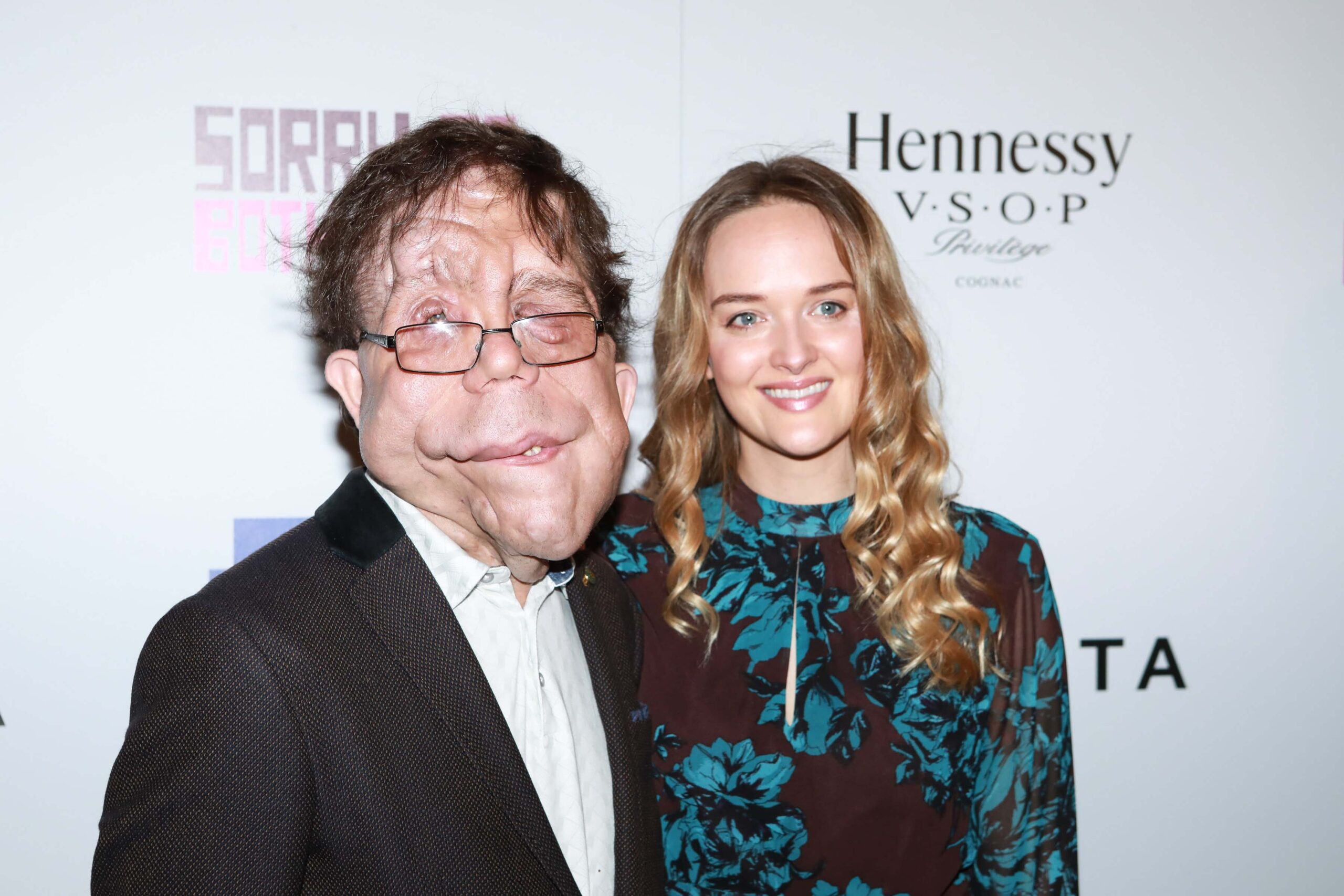
“I read somewhere nine out of 10 women don’t like how they look and I think that’s because they’re comparing themselves to the airbrushed images they see in Vogue or FHM. People lack a real literacy in the media. They don’t know what goes into producing these images. Media literacy should be part of education. I think we’ve done beauty a great disservice by quantifying it,” he explained.
Adam came across a banner for the group Changing Faces while paying one of his routine visits to Great Ormond Street Hospital, a children’s hospital in London. They advertise themselves as the “UK’s leading charity for everyone with a scar, mark, or condition on their face or body.” Pearson was immediately motivated to participate.
Without telling his parents, Adam contacted the organization and got help with how to stay positive. One thing they taught him was to remember that the one’s treating him poorly “are the ones with the problem, not you.”
After completing his business management degree at Brighton University, he was hired to work in a number of Channel 4 and BBC television shows. These included appearances on The Undateables and Beauty and the Beast, two television programs that explore how society regards impairments of various kinds.
In 2011, Adam Pearson’s life would take another drastic turn. Changing Faces contacted him, saying that producers were looking for a male character for the film Under the Skin.
The science fiction movie Under the Skin, which was helmed by Jonathan Glazer, was a great hit. Pearson co-starred in the film with Scarlett Johansson, a Hollywood icon, as a method of demonstrating to the world that anyone can pursue their aspirations, regardless of appearance.
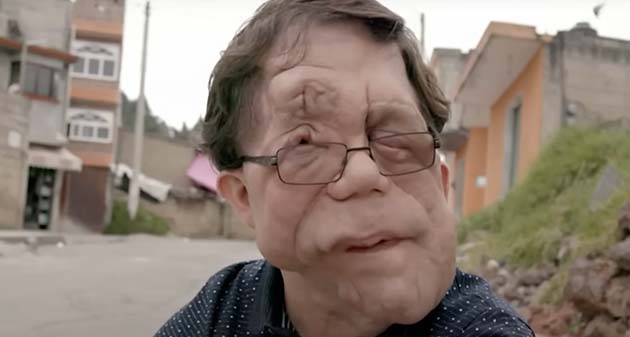
“One of the main reasons for taking the role was because it was so moving and honest,” Adam said.
“For me, the film is about what the world looks like without knowledge and without prejudice. It’s about seeing the world through alien eyes, I guess.”
In front of the camera, he proved to be a natural. Much of the dialogue, according to Pearson, was improvised, and working with Johansson was a unique experience. In the end, he got her private email address, and they even had to shoot a nudist scene together for the movie.
“They just said ‘action’ and you do it,” he said. “I didn’t really think about it, I didn’t broadcast the information [that he was in the film] until quite near the release. I didn’t tell some people at all and just took them to see the film, I mean, my friend Heidi hasn’t made eye contact with me for a week.”
“[Scarlett Johansson was] brilliant. She’s really nice, charming, funny and intelligent once you get over the feeling of ‘Oh my God, this is Scarlett Johansson!’”
For Adam, becoming an actor was about more than just motivating others to follow their passions and avoid letting anything stand in their way. More importantly, it gave him the opportunity to publicly fight the stigma associated with depicting impairments on TV.
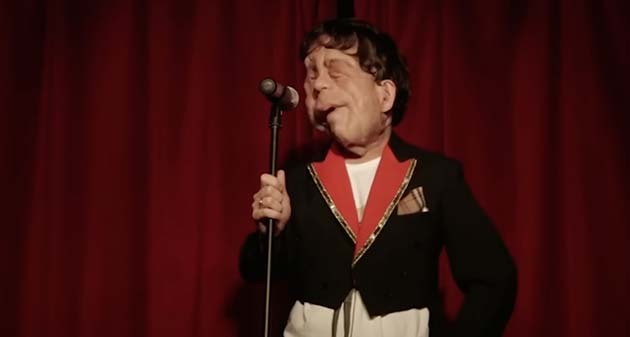
He explained: “There’s a lot of fear around the unknown. If I can try to be as normal as possible and show there’s nothing to fear – either on film or day to day, going round the corner to go shopping for milk – then the more people see it in wider society, the less stigma there is. If I just sit at home and mope, hugging the dog and crying, nothing’s going to change.”
Since the release of Under the Skin in 2013, Adam has kept up his acting career and activism for disabled rights. He portrayed himself in the 2017 motion picture DRIB, and he made an appearance in Chained for Life in 2019. Adam was a supporting actor in the Sebastian Stan-starring film A Different Man and was called “an actor of great charm” by The New York Times.
Adam is motivated to eliminate the stigma associated with his impairment, as was already established. He has delivered numerous TED speeches and spoken at numerous conferences, including the World Health Innovation Summit. He also serves as an ambassador for The Prince’s Trust, Changing Faces, and Us In A Bus, for which he has been recognized with both a RADAR Award and a Diana Award.
In 2022, he was included on the top 100 list of the UK’s most influential disabled people.
Pearson recently competed on Celebrity Masterchef. Unfortunately, he was the first contestant to leave the cooking competition, but ultimately, it didn’t matter. He was on Celebrity Masterchef, which demonstrates something that is undeniably more significant: you can accomplish whatever you love, regardless of your appearance or potential handicap.
“Often with minority talent, and particularly disabled talent, they get pigeonholed into only doing massive air quotes here, disability thing,” Pearson told Metro.
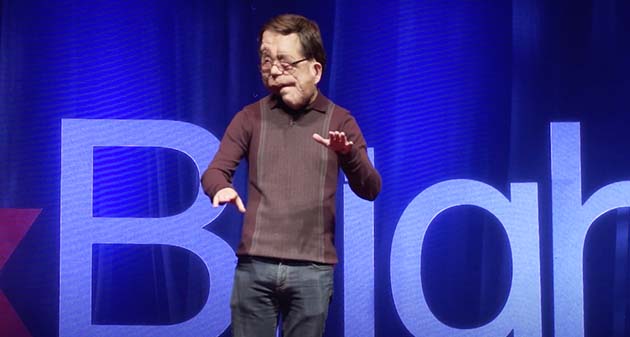
“I’ve got no idea what disability things are, so if someone could let me know and I could start doing them, that would be great! But no, it was something that existed outside of that realm, and it seemed like a real opportunity to sort of step out of that bubble.”
Adam does not have a girlfriend as of the time of writing. There is a 50% possibility that he will pass on his disease to any children he has, but if it wasn’t clear by now, he is a really upbeat person.
He keeps trying to change the world for the better. Whatever occurs, he is confident that any future children will lead wonderful lives, even if they do have the same genetic disease as him.
“My kids will be genetically awesome anyway,” Pearson proclaimed.
Adam Pearson is a true inspiration. Please, share this article to spread his story – let’s help him in breaking the stigma!
